Rondi Bauer Olson's Blog, page 2
July 27, 2016
Dealing with Disappointment & Delays - Going with a Small Press versus Self-Publishing
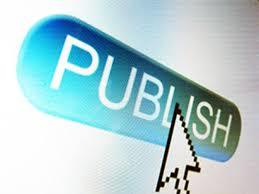 To self-publish, or not to self-publish.
To self-publish, or not to self-publish.A year ago I had decided I was going to self-publish my novel, ALL THINGS NOW LIVING. A number of agents and editors had told me it was good enough to publish, it just wasn't for them, and several of my friends had had quite good success self-publishing. I thought my book would be better off out there than languishing in a drawer.
Then I got the call. You know. From a publisher who wanted to publish my book. Granted, a small press, but still, a real, traditional publisher.
*Squee!*
I was flattered, but didn't sign automatically. I had already begun the self-publication process, but as I reviewed what my self-publishing costs would be, including edits, proof-reading, design and formatting, etc, I realized it would be very easy to spend thousands of dollars to put out a professional, high-quality product.
So I signed. And I was thrilled! I had always wanted a traditional publishing deal, and I had one.
Then came the delays. I wasn't too upset about missing the original release date, as it had always been tentative, but when my second, solid release date passed without the book being finished, I went into a writing funk. I stopped working on my sequel. I didn't post on my blog. When people asked me about my book, I wanted to drop to the floor and curl into a little ball.
The other day a friend asked me if I regretted signing with a small publisher instead of self-publishing. Honestly, even in the midst of disappointment, the answer was no. Even though my book has been delayed, it is still coming out. The edits I got made the book so much better, the design is beautiful, and the formatting is coming along.
I know there are a lot of people out there who have the time and talent to do everything themselves, but that route wasn't the best for me. I am still happy to be with my "little publishing company that accomplished so much and then seemed to go into hibernation", as my editor described her company. Sometimes little things grow big, and slow starts don't mean slow finishes.
Published on July 27, 2016 07:45
May 30, 2016
What the Novelist Can Learn from Other Artistic Disciplines
 The arts inform us and each other.A few years ago, I went to a writer's conference with my son. I thought we'd go to different sessions, as I was working on my novel and he was interested in screenwriting, but he was quite young at the time, and unwilling to attend the sessions he was interested in by himself. I ended up going to all the screenwriting sessions that conference. They were fantastic! No, I didn't end up writing a screenplay, but in addition to learning about what has become one of my favorite writing books, SAVE THE CAT by Blake Snyder, I finally understood how to show and not tell.
The arts inform us and each other.A few years ago, I went to a writer's conference with my son. I thought we'd go to different sessions, as I was working on my novel and he was interested in screenwriting, but he was quite young at the time, and unwilling to attend the sessions he was interested in by himself. I ended up going to all the screenwriting sessions that conference. They were fantastic! No, I didn't end up writing a screenplay, but in addition to learning about what has become one of my favorite writing books, SAVE THE CAT by Blake Snyder, I finally understood how to show and not tell.Since then, I've gone out of my way to attend sessions I initially don't think are relevant to my writing, classes on poetry, acting, song writing, and illustration. Some of those sessions have been the best I have gone to, and have done the most to improve my writing.
Which really shouldn't be surprising. All art is the expression of human creativity. Learning more about different art forms can't help but improve our own expression.
Published on May 30, 2016 05:48
May 19, 2016
An Apology I'm Not Going to Make
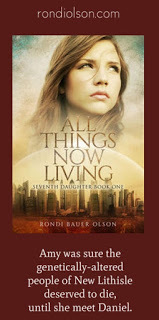 Coming Soon! Scary!
Coming Soon! Scary!As the release of my debut novel approaches, and becomes more real, I am starting to panic.
The book really isn't that good.
At least, that is the fear that overtakes me as people tell me they are going to be buying my book, with the implication being they are actually going to read it.
The only thing I can think of is one critque I got a few years back, where the editor wrote, "You write like Suzanne Collins, only worse."
Yes. That's probably true. I'm not JK Rowling, or Suzanne Collins, or one of the many authors whose work I admire.
I'm only me.
And while I did my best, I'm debut author, still learning.
That doesn't mean ALL THINGS NOW LIVING is bad. As I've gone over final edits, I've been surprised that maybe it's even a little good.
That doesn't mean there aren't things people won't like. So, before my book comes out, here are my true confessions:
I wrote in first person, present tense. This point of view isn't for everyone. Some have called this point of view gimmicky. I don't agree.
My book is for young adults. There are no swear words, sex scenes, or graphic violence. I know some say writing for teens, or writing "clean" for any age group, brings less depth to difficult topics. Okay, maybe my book isn't gritty, but I don't shy away from truth, no matter how dark it is.
My book is not a great work of literature. As I've said to those who ask, the plot is basically "plucky girl saves the world, inspired by hot boy." I wasn't aiming for a Man Booker or Nobel prize. I only want my novel to be entertaining and thought provoking. I think I've achieved that, and I think that's enough.
There will be people who love my book. There will be people who hate it. I'm okay with that, and while I know my book isn't perfect, the one apology I will never make is for writing it. I did my best, and that is all I can do.
If you are so kind as to be one of the people who someday buys and reads my book, I have only one request. Whether you enjoy the book or not, please appreciate how difficult it is for any artist to put their work out there. We are opening our souls to the world, and that is not something everyone can do.
Published on May 19, 2016 06:26
May 3, 2016
#WeNeedDiverseBooks
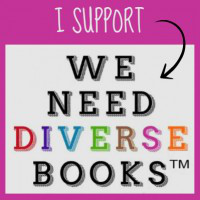
I attended a large SCBWI conference this past weekend, with over 500 in attendance, and I noticed something I notice every SCBWI conference. The attendees were overwhelmingly white, upper middle class, middle-aged women.
Now, I don't have anything against white, upper middle class, middle-aged women. I'm one myself! But it made me think about the lack of diversity in children's literature, and it's cause.
Some have suggested the publishing industry is bigoted, or maybe readers are. Certainly, the white-washing that has regularly occurred on book covers (http://www.yalsa.ala.org/thehub/2012/12/10/it-matters-if-youre-black-or-white-the-racism-of-ya-book-covers) would hint that is possible, but I suggest a different reason.
Money.
Here is my reasoning. There isn't a lot of money in writing for children and young adults. Unless your name is JK Rowling, you will probably need to keep your day job, have a significant other who supports you, or be retired to pursue a writing career. But what if you have to keep two or even three jobs to make ends meet? What if you don't have a significant other, or you have no retirement savings, so you have to keep working when many others your age have retired? The fact of the matter is, if you are part of a marginalized community, chances are you don't have as much in the way of financial resources as others.
I'm not the only one who sees money as a significant issue in regards to diversity in children's literature. We Need Diverse Books has a number of scholarships available to help members of marginalized groups live their dream of writing, and I'm proud to say, at the Wild, Wild, Midwest SCBWI conference last weekend, thousands of dollars were raised to help fund these scholarships.
I know, some people will say one doesn't have to be part of a marginalized group to write about them, and certainly, that is true. Anyone can write diverse books, and we all should. But I personally feel no one is better able to write about a culture than the people inside that culture, and if money is the main issue, shouldn't that be a priority?
Published on May 03, 2016 06:38
April 3, 2016
The Truth About Advances
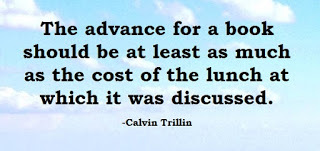
I never expected to sell my manuscript for tons of money. I had fantasized about it, sure, but as big publishers passed, I knew the six-figure, multi-book contract was not going to happen. Still, when my small, independent publisher made me an offer, I was a little bit shocked.
Really? That's it?
Years of work. Thousands of dollars invested. For lunch money.
Okay, maybe a little bit more than lunch money, but you get the idea. Not very much. I talked to some of my writer friends, as well as a couple of small publishers, and here are a few things I learned about advances:
1. Even the big publishers are offering smaller advances. While big deals still happen, most debut and mid-list authors can't expect a lot. I heard numbers from $1,000 to $5,000.
2. Bigger advances don't mean better advances. Advances are just that, pay advances. A number of writers told me they wish they'd gotten less money upfront so they could have earned out their advances sooner. Why? Many authors described the time waiting until they'd earned their advance out as very stressful, filled with the fear they would never make enough sales. A lower advance takes off some of that pressure.
3. Small independent publishers typically offer hundreds of dollars instead of thousands. Shave off one zero from each of the above numbers and you get the idea.
4. A few writers I spoke with didn't get any advance at all, despite the fact their publishers called themselves "traditional" publishers. I'm not sure how traditional a publisher is if they don't offer an advance at all, but a couple of the writers were happy with their publisher despite no upfront money. I personally wouldn't do this, but I guess if you're getting a lot of great services from your publisher and aren't spending any money yourself, it could still be a decent deal.
Would you accept a publishing contract that didn't include an advance? How small of an advance would you be willing to accept?
Published on April 03, 2016 09:53
March 18, 2016
Fan Fiction - Good or Bad?
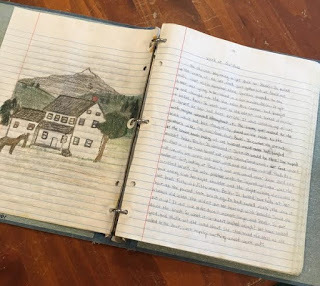 My first novel, handwritten by yours truly when I was 13. I called it my own, but it was fan fiction.In recent years a number of authors have become very successful writing fan fiction. As in, best-seller and movie-deal successful. This tends to irk those of us who are purists. After all, our work is original. We don't understand how the market could reward people who didn't even come up with their own ideas. But is fan fiction really that bad?
My first novel, handwritten by yours truly when I was 13. I called it my own, but it was fan fiction.In recent years a number of authors have become very successful writing fan fiction. As in, best-seller and movie-deal successful. This tends to irk those of us who are purists. After all, our work is original. We don't understand how the market could reward people who didn't even come up with their own ideas. But is fan fiction really that bad?As much as I am loath to admit it, fan fiction is actually a good thing, and here's why:
1. Writing fan fiction inspires a lot of people to become writers, me included. The stories we read don't end when the book stops. We imagine different endings, or new scenes, and when we get really brave, we write them down. My first novel, written when I was 13, was Bonanza fan-fiction. Sure I changed names and a few minor details, but there were a lot of similarities between my novel and your average Bonanza episode. Writing that first novel, no matter how derivative it was, gave me the confidence to believe I could write.
2. Writing fan fiction makes learning to write easier. Two of the most difficult things in writing are world building and character development. In fan fiction, those things have already been established for you. Think of it as writing with training wheels on. Eventually you'll have to go out on your own, but not having to master every aspect of writing at once makes the process more enjoyable, and if something is fun, we're more likely to keep at it.
3. For serious writers, fan fiction will evolve into something more. There is one fan-fiction series I can't bear to read. The characters are so close to the ones in the original series, I can't help but think of the original series while I'm reading. This same author, however, has written other books, and they are some of my favorites. Same world, same concept, but now so far removed from the original they aren't recognizable as fan fiction in anyway.
In short, we've all got to start somewhere, and fan fiction isn't a bad place to begin.
Have you ever written fan fiction? What book or movie was your fan fiction based on?
Published on March 18, 2016 07:14



